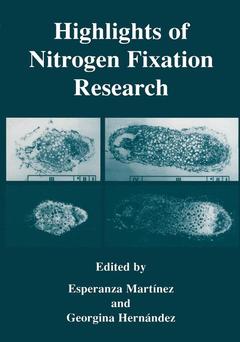Description
Highlights of Nitrogen Fixation Research, Softcover reprint of the original 1st ed. 1999
Coordinators: Martínez Esperanza, Hernández Georgina
Language: English
Subjects for Highlights of Nitrogen Fixation Research:
Keywords
Alanin; Calcium; Colon; Cytosol; DNA; Expression; Glutamin; Polysaccharid; Polysaccharide; Xylem; genetic engineering; metabolism; nitrogen; physiology; roots; Systematic Botany
Publication date: 10-2012
305 p. · 17.8x25.4 cm · Paperback
305 p. · 17.8x25.4 cm · Paperback
Description
/li>Contents
/li>
For 31 years, the North American Symbiotic Nitrogen Fixation Conference (for merly Rhizobium Conference) has been a forum for scientists and graduate students to discuss their research advances, extending from basic aspects to agricultural appli cations, and dealing with topics ranging from bacterial genetics and metabolism to plant genetics and physiology. Nitrogen fixation, being a major life-supporting process on this planet, has attracted the interest of researchers for more than one century. Nitrogen fixation is responsible for the conversion of "inert" dinitrogen (N ) gas from the atmos z phere into usable ammonia, replacing the fixed nitrogen constantly being lost to the atmosphere by the denitrification process. Worldwide agricultural productivity is deter mined by the availability of fixed nitrogen in all its forms, which the continually increas ing human population depends upon for survival. An international momentum is developing in the use of biofertilizers to improve legume and non-legume crop yields and in the study of genomics in this area. New studies are being undertaken in several laboratories to study novel nitrogen-fixing systems, including non-legume crops. The North American Conferences on Symbiotic Nitrogen Fixation have periodically chronicled the advances in our knowledge of this area. For the first time, this conference was held in Mexico. Thus, all three North Amer ican countries have been hosts for this event. This year conference brought nearly 200 scientists from 18 different countries presenting lectures and over 80 posters.
Preface. Nitrogen Fixation and the Biosphere; W.E. Newton. Genetic and Metabolic Engineering of Rhizobium Etli to Modify (Enhance) Nitrogen Fixation in the Symbiosis with Phaseolus vulgaris; J. Mora. Modulation of Key Symbiotic Metabolic Pathways Through Reverse Genetics of Transgenic Legumes; G. Hernández, et al. Constitutive and Nodule-specific Over-expression of Cytosolic Glutamine Synthetase (GS1) Genes in Alfalfa; J.L. Ortega, et al. Cloning and Developmental Expression of a Nodule Enhanced Sucrose Synthase cDNA from Alfalfa; D.L. Robinson, et al. Alanine and Ammonia Release by N2-fixing Bradyrhizobium japonicum Bacteroids; J.K. Waters, et al. Is Bacteroid alpha-Ketoglutarate Dehydrogenase needed for Nitrogen Fixation? L.S. Green, D.W. Emerich. Hopanoid Lipid Content of Bradyrhizobium Bacteria is dependent on Culture Conditions; E.L. Kannenberg, et al. Phosphate Metabolism in Rhizobium: Issues, Contrasts, and Comparisons; T.R. Mcdermott. Recent Advances in the Physiology of Drought Stress Effects on Symbiotic N2 Fixation in Soybean; R. Serraj, et al. Rhizobium meliloti Lon Protease Plays an Essential Role in Alfalfa Symbiosis; M.L. Summers, T.R. Mcdermott. Flavonoid Enhancement of Sorghum Root Development; K.J. O'Callaghan, et al. Analysis of Factors Affecting Competition for Nodulation of Legumes by Rhizobium leguminosarum; M.F. Hynes, et al. Characterization of Rhizobia Associated with Dalea spp. in Natural Prairies and Revegetation Areas in Minnesota; P.H. Graham, et al. Distribution and Characteristics of Bradyrhizobium spp. Nodulating African Soybeans; R. Abaidoo, et al. What does Strain Persistence Really Mean? J.E. Thies, et al. Isolation andCharacterization of a DNA Fragment Containing Genes for Mimosine Degradation fromRhizobium sp. Strain TAL1145; D. Borthakur, M. Soedarjo. Sinorhizobium meliloti Products Increase Carbon Metabolism in Alfalfa; D.A. Phillips, et al. Ecology and Plant Growth-Promoting Activities of the Natural Association Between Rhizobium leguminosarum bv. Trifolii and Rice Roots; F.B. Dazzo, et al. Bacteriocins of Rhizobium leguminosarum: a Molecular Analysis; S. Twelker, et al. Suppression of Plant Defence in the Medicago sativa (Alfalfa)-Sinorhizobium meliloti Symbiosis; K. Niehaus, et al. Unique Aspects of Nod Gene Expression in Bradyrhizobium japonicum; J. Loh, et al. Control of Root Nodule Initiation in Medicago; A. Kondorosi, et al. Differential Expression of Symbiosis-Related Genes in Yellow Lupine; M.M. Sikorski, et al. An Isoflavone from Soybean Roots Induces Sinorhizobium fredii Strain USDA257 to Produce Pilus-Like Surface Appendages; S.G. Pueppke, et al. Rhizobium etli (Re) Lipopolysaccharide (LPS) Structure: Comparison with the LPSs from Rhizobium leguminosarum (RL) and Related Rhizobium Strains; R.W. Carlson, et al. Two different Signal Peptidases and Their Possible Roles in the Biphasic Life Cycle of Bradyrhizobium japonicum; P. Müller, et al. Xylem Colonization of Sesbania rostrata by Azorhizobium caulinodans ORS 575; K.J. O'Callaghan, et al. Extracellular Calcium Flux in Root Hairs Responding to Nodulation Factors; L. Cárdenas, et al. Use of T-DNA Tagging to Identify Plant Genes Involved in Symbiotic Nitrogen Fixation; L. Skøt, et al. Physical and Genetic Organisation of pNGR234a; X. Perret, et
© 2024 LAVOISIER S.A.S.




